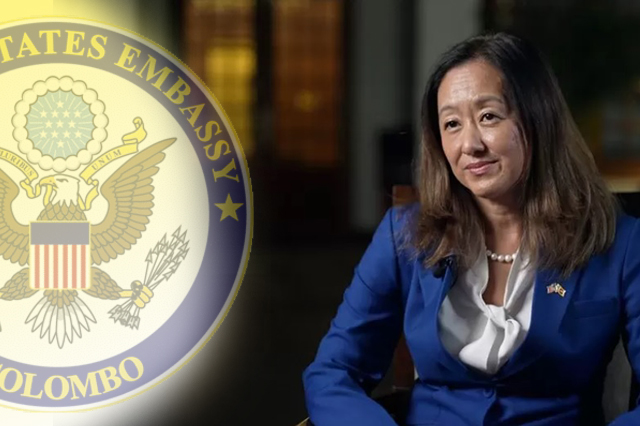Julie Chung's interference in Sri Lanka's legislative affairs must halt immediately, as it signifies a potentially perilous encroachment upon the nation's sovereignty.
Editorial
In a world where the spotlight rarely shines on the same place twice, Sri Lanka has found itself thrust into international scrutiny, not for its picturesque landscapes or vibrant culture, but because of the unwavering attention of US Ambassador to Sri Lanka, Julie Chung, in the nation’s legislative affairs. Her latest foray into Sri Lankan policymaking, where she strongly urges authorities to prioritize citizen rights in their deliberations on the Online Safety Bill and the Anti-Terrorism Bill, has ignited a fiery debate. Beneath the surface of her seemingly noble intentions lies a piercing question: Is this genuine diplomacy or outright interference in the sovereign affairs of a nation?
 |
| Ambassador Julie Chung, U.S. Ambassador to Sri Lanka [File Photo] |
Chung’s resounding message, echoed through the corridors of Twitter (now X), emphasizes the dire necessity for diverse input from the tech sector, civil society, and expert voices as Sri Lanka navigates these critical bills. She unwaveringly proclaims that safeguarding freedom of expression stands as an unyielding principle that must not falter. While this stance may align with democratic ideals, the crux of the matter lies in the manner and context of her intervention.
It is crucial to remember that the United States itself bears the weight of a complex history when it comes to legislation affecting human rights. The USA PATRIOT Act of 2001, signed into law by President George W. Bush, granted authorities sweeping powers that extended their reach across the globe, with dire consequences. Detentions without trial, exemplified by the grim reality of Guantanamo Bay, have since been deemed catastrophic mistakes. The irony here is glaring: a nation that once endorsed such actions now endeavours to impart wisdom on human rights to others. Perhaps Julie Chung was still cradled in her mother’s arms during those dark days.
However, the pivotal question arises when we acknowledge the glaring disparities between developed Western nations and nations like Sri Lanka. While the Western world, led by the United States, passionately champions democracy as the zenith of governance, it is imperative to remember that Sri Lanka grapples with unique challenges, grappling with pressing issues that demand immediate attention.
Julie Chung’s call to prioritize citizen rights does bear merit, provided that the government she represents demonstrates this commitment through action. Nonetheless, it is paramount to scrutinize the origins and motivations that underpin this advocacy. The concerns raised by certain quarters in Sri Lanka regarding foreign interference in their internal matters should not be cavalierly dismissed. The crux of the issue is not the aspiration for democracy or human rights but rather the means by which they are pursued.
Recent developments in Sri Lanka, such as the apprehension of an alleged criminal involved in child pornography, underscore the urgent necessity for effective legislation to combat such abhorrent crimes. Instead of offering constructive support and fostering collaboration, Chung’s statement casts a shadow of foreign influence over local governance.
We must underscore the paramount importance of respecting a nation’s sovereignty and its prerogative to shape its laws in accordance with its unique circumstances and needs. Diplomacy should be conducted in the light of day, marked by transparency, respect, and a spirit of cooperation, rather than through clandestine channels that hint at external agendas.
While the pursuit of human rights and democracy is a noble endeavour, the manner in which it is pursued demands meticulous scrutiny. Sri Lanka, like any other nation, deserves the autonomy to legislate in the best interests of its citizens, free from undue external influence. Diplomacy, in its truest form, must uphold integrity and transparency, ensuring that the voice of the people takes precedence above all else.











Post a Comment